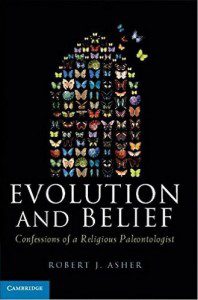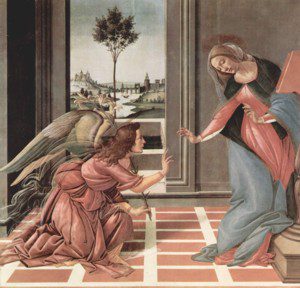 One of the common objections to evolutionary creation relates to the lack of evidence for macro-evolution as opposed to micro-evolution. Most people have no problem with evolution of a sort producing variation within species. Many will even accept the evolutionary formation of new closely related species (e.g. domestic dogs, wild dogs, wolves, foxes, jackals, and coyotes from a dog-like predecessor). But whales from even-toed ungulates (i.e. the group that includes pigs, camels, and hippos)? This strains credulity. The evidence for common descent, however, is powerful, buried in the bones and the genes. This is worth a closer look. Today I am going to start a series that looks more closely at the evidence, beginning with Robert Asher’s book Evolution and Belief: Confessions of a Religious Paleontologist. Dr. Robert Asher is Curator of Vertebrates in the Museum of Zoology at the University of Cambridge. His research focuses on the morphology and interrelationships of living and extinct mammals. His book provides a fascinating and quite readable explanation of the evidence for evolution, concentrating on examples in mammalian evolution (his area of expertise).
One of the common objections to evolutionary creation relates to the lack of evidence for macro-evolution as opposed to micro-evolution. Most people have no problem with evolution of a sort producing variation within species. Many will even accept the evolutionary formation of new closely related species (e.g. domestic dogs, wild dogs, wolves, foxes, jackals, and coyotes from a dog-like predecessor). But whales from even-toed ungulates (i.e. the group that includes pigs, camels, and hippos)? This strains credulity. The evidence for common descent, however, is powerful, buried in the bones and the genes. This is worth a closer look. Today I am going to start a series that looks more closely at the evidence, beginning with Robert Asher’s book Evolution and Belief: Confessions of a Religious Paleontologist. Dr. Robert Asher is Curator of Vertebrates in the Museum of Zoology at the University of Cambridge. His research focuses on the morphology and interrelationships of living and extinct mammals. His book provides a fascinating and quite readable explanation of the evidence for evolution, concentrating on examples in mammalian evolution (his area of expertise).
But what does this have to do with the virgin birth?
The first chapter of Evolution and Belief looks at the relationship between science and religion. Asher discusses such issues as agency and cause, methodological naturalism, and design. One of the examples that Asher uses is the virgin birth. His take on this is quite different from that of most evangelicals, but then Asher is not an evangelical, and like many he explicitly disavows the designation.
Robert Asher is not an atheist; he does not rule out the existence of the supernatural or spiritual. He is, as he describes himself, a religious paleontologist. He sees design in creation, but doesn’t see design and randomness as opposites.
The equations “purpose = God” and “randomness = atheism” are contingent upon some preconceived notion of order, and we humans have no choice but to understand “order” from our own desperately parochial perspective. The fact that we find it difficult to appreciate the creative power of apparent randomness does not mean that God suffers from this problem too. This very simple observation was made by Darwin in all six editions of the Origin: “We naturally infer that [complex organs have] been formed by a somewhat analogous process [to human design]. But may not this inference be presumptuous? Have we any right to assume that the Creator works by intellectual powers like those of man?”
… Recognizing that the “intelligence” of a creator applied to phenomena such as the origin of life or the cosmos – issues wholly beyond the scope of evolutionary biology – might work through techniques that resemble randomness to a human strikes me as perfectly reasonable, even if it is not amenable to rational (dis)proof. In contrast, requiring that God’s style of invention has to resemble our own, as do many creationists and atheists alike, seems extraordinarily presumptuous and vain. (p. 14)
At the end of the chapter he turns the discussion to miracles, and especially the miracle of the virgin birth of Jesus.
 Matthew 1:18 relates the claim:
Matthew 1:18 relates the claim:
This is how the birth of Jesus the Messiah came about: His mother Mary was pledged to be married to Joseph, but before they came together, she was found to be pregnant through the Holy Spirit.
Joseph responds to Mary’s pregnancy by planning to divorce her and an angel in a dream reiterates the claim “what is conceived in her is from the Holy Spirit.” Luke 1:34-35 records Mary’s response when told she would conceive and give birth to a son, the Messiah.
“How will this be,” Mary asked the angel, “since I am a virgin?” The angel answered, “The Holy Spirit will come on you, and the power of the Most High will overshadow you. So the holy one to be born will be called the Son of God.
The very idea of a miraculous conception, that a virgin conceived and bore a son, hits a nerve in our secular Western society – both modern and postmodern. Frankly is it unscientific. Robert Asher does not see acceptance of the virgin birth as traditionally understood to be either reasonable or necessary. This doesn’t mean that he throws the Bible out. On the contrary he sees the gospels as basically trustworthy with much of of the New Testament (especially Paul’s letters and Mark’s gospel) written “well within the range of an oral tradition based on eyewitness accounts.” (p. 24) Asher’s reasoning about the virgin birth is rooted in his understanding of cause and effect in science.
However, does this enable me to believe in an actual human being born of a virgin? No it does not – at least not in a biological sense, which is how most people understand this question and how, therefore, I should answer it. Female humans do not give birth unless they have been inseminated. As he was a human being, I infer based on what I know of biology that Christ would have developed in His mother’s womb, from zygote to morula to embryo to fetus. … (p. 24)
Everything that I understand about human biology indicates that He, too, had a biological father. There is no doubt, however, that this father was perceived as divine by his followers. As a human being, of course Christ had a biological father; it is not rational to believe otherwise. … Simply stated, Christianity is my faith. It is not an unshakable faith, nor do I believe literally in many parts of the Bible. Indeed, much of the text of this chapter disqualifies me as a theist Christian by most evangelical standards. Nevertheless, Christianity seems to me a legitimate account of the agency behind life, and while the causes of life’s diversity are fascinating, they are not of immediate relevance to this faith. (p. 25)
This paragraph from Asher is rooted in a discussion of miracles, because the virgin birth, or more accurately virginal conception, if true in a biological sense, is a miracle. It is an intervention by God into the natural order. Jesus was fully human, therefore he carried DNA that came from two sources – male (he had a Y chromosome) and female (Mary’s we presume). If the male source didn’t come from Joseph in the usual way it had to come from somewhere. Whose DNA was it? Would it have traced to Joseph? Was it something else entirely synthesized by God for this purpose? Asher doesn’t bring this question up specifically, but he does focus in on the question of intervention. Rather than quote a large segment I will choose a few particularly pertinent sections:
Let me phrase this differently. Do I believe in miracles? If by “miracle” you mean a spontaneous failure of a natural law due to the contrary influence of some supernatural agency, then no. … However, this is not at all the same thing as denying the existence of a divinity, including the Christian sort. … The “do you believe in miracles?” question assumes an opposition between “nature” and “god” that is wholly our own fabrication, as if the two compete with one another for our attention. This question presumes a philosophy that the two things are independent, even antagonistic – but I don’t think they are. Rather one is an expression of the other. God cannot “intrude” into the normal operation of nature because, the way I see it, nature is a part of God; it represents God’s thought, or laws, in action. He cannot intrude upon himself. (p. 25-26)
Asher’s view of the virgin birth is shaped by his understanding of biology, of cause and effect, and by his view of God. There are scientific, philosophical, and theological reasons to question the traditional view of the virgin birth.
Another perspective. There are other ways to look at the issues surrounding the virgin birth though. The Rev. Dr. John Polkinghorne comes to a different conclusion in his short book Testing Scripture. Dr. Polkinghorne is a scientist, a theoretical physicist and Professor at Cambridge before he became an Anglican priest. He understands the scientific concepts of cause and effect. He takes Scripture seriously, but not with the assumptions of inerrancy common in American evangelicalism. Still, Dr. Polkinghorne accepts the virginal conception of Jesus.
Luke, very explicitly in his story of the Annunciation (1.34-35), and Matthew, more obliquely (1.18), both assert the virginal conception of Jesus. Christian tradition has attached great significance to this, often rather inaccurately calling it the ‘virgin birth’. Yet in the New Testament it seems nowhere as widely significant as the Resurrection. Paul is content to simply lay stress on Jesus’ solidarity with humanity: ‘God sent his Son, born of woman, born under the law’ (Galatians 4.4). The theological importance of the virginal conception lies in its lending emphasis to the presence of a total divine initiative in the coming of Jesus, even if this truth is much more frequently expressed by the New Testament writers simply in the language of his having been sent. Jesus was not opportunistically co-opted for God’s purpose when he was found to be suitable, but he was part of that purpose from the start. The virginal conception is a powerful myth, and I believe that in the religion of the Incarnation the power of story fuses with the power of a true story, so that the great Christian myths are enacted myths. On this basis, I find myself able to believe in the virgin birth, even if the motivating evidence is less extensive than for the belief in the Resurrection. (p. 68-69 Testing Scripture)
Interaction not Intervention. Robert Asher sees the virginal conception as proposing an intervention by God and rejects it on this basis. John Polkinghorne looks behind the statements at the reason for the story. One of the most important criterion for thinking through the incredible claims in scripture is God’s interaction with his creatures rather than his intervention in his creation. The miracles ring true when they enhance our understanding of the interaction of God with his people in divine self-revelation. The virginal conception is part of the Incarnation, “The Word became flesh and made his dwelling among us”. The magnificent early Christian hymns quoted by Paul in Col 1.15-20 and Phil 2.6-11 catch the essence of this enacted myth as well. Where did the male DNA come from? I rather expect that if we could do the genetic testing it would trace back to Joseph. After all, the Messiah comes from the house and lineage of David. The genealogies in Matthew and Luke both run from Joseph to David. But Jesus was not merely a man, “opportunistically co-opted for God’s purpose.” He is the Word become flesh.
It makes no sense to try to defend the virginal conception, the resurrection, or any of the other signs or miracles related in the New Testament, separate from the story of the Gospel, the life, death, and resurrection of Jesus as God’s Messiah. In the context of God’s mission within his creation the miracles make sense. Separate from this they will never make sense.
Is there an important distinction between intervention and interaction?
Why do you believe in the virginal conception? Or if you don’t, why not?
If you wish to contact me directly you may do so at rjs4mail[at]att.net.
If interested you can subscribe to a full text feed of my posts at Musings on Science and Theology.
















